OP2 Sequence
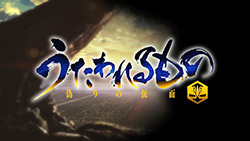 |
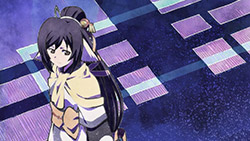 |
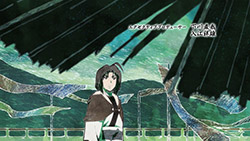 |
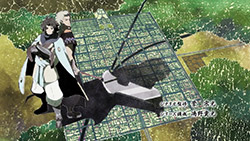 |
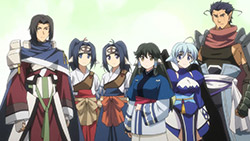 |
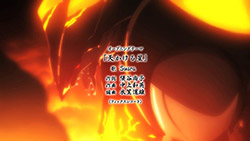 |
OP2: 「天かける星」 (Ten Kakeru Hoshi) by Suara
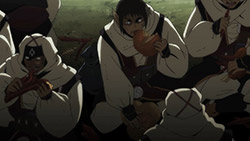 |
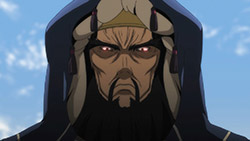 |
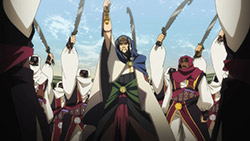 |
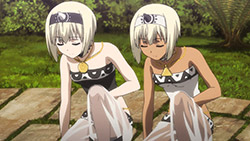 |
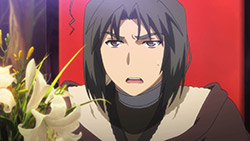 |
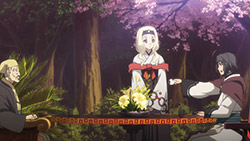 |
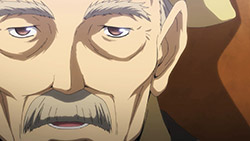 |
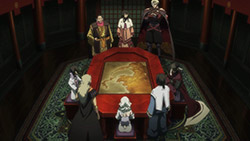 |
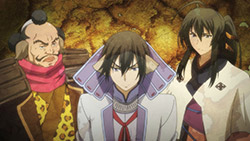 |
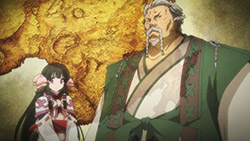 |
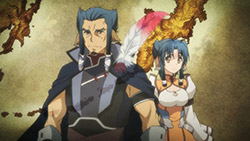 |
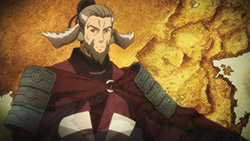 |
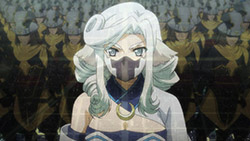 |
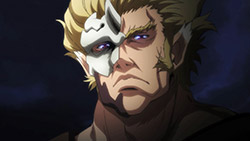 |
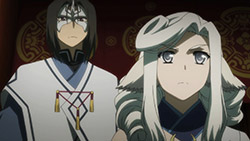 |
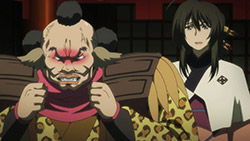 |
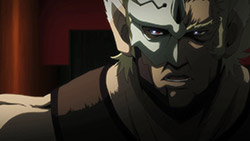 |
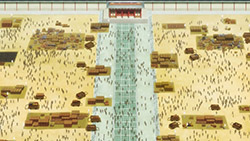 |
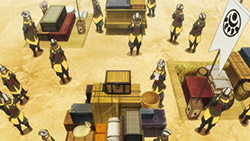 |
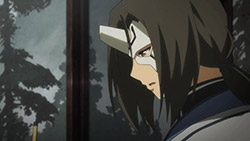 |
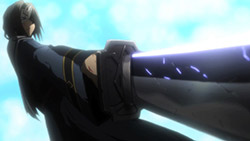 |
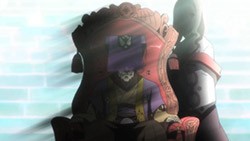 |
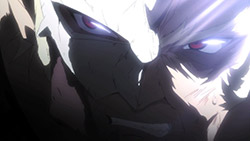 |
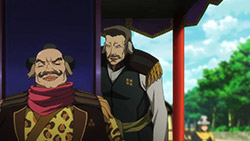 |
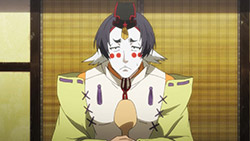 |
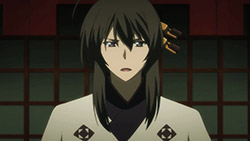 |
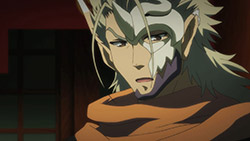 |
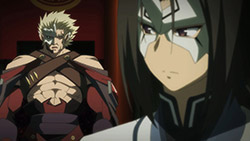 |
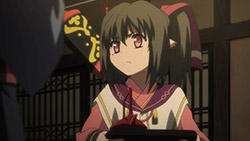 |
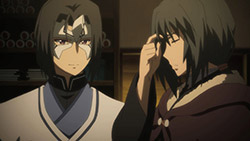 |
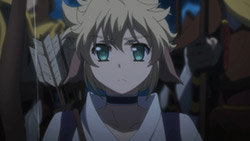 |
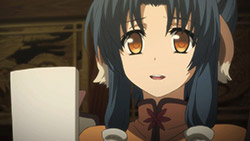 |
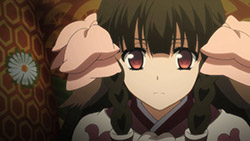 |
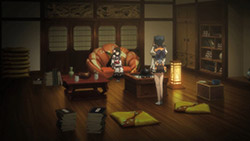 |
 |
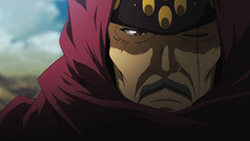 |
「八柱将」 (Hachi Hashira Shou)
“The Eight Pillar Generals”
Prepare yourself for a crash course in Yamato politics. Not an entirely unpleasant one, but it’s a lot to take in.
The Barbarian Uzuurussha
Though Yamato is an ancient name of Japan, and the name of the dominant ethnic group within Japan today (and, like, twelve other hella Japanese things), the current plight of Itsuwari no Kamen’s Yamato reminds me more of ancient China. Perhaps that’s my ignorance of Japanese history showing, but it feels a lot like China’s constant struggles—up until a few hundred years ago—with nomadic steppe horse archers. (Warning: I’ve been listening to a lot of Hardcore History lately, so history nerdery incoming.)
The example you’ll be most familiar with is the Mongol Empire that began under Ghengis Khan, but they’re only the most successful example, because China had to contend with horse archers like the Xiongnu well before the Mongols ripped them a new asshole (and ultimately founded the Yuan dynasty, whoopsie, those barbarians made themselves respectable. Pay attention, Yamato). And there was a certain pattern to these conflicts that Itsuwari no Kamen is riffing on. First of all, hardship: The peoples of the Asian steppes had it hard, and this tended to breed a hardy, brutal people. The father at the end said as much. I would caution that starvation and poverty do not always make one stronger, as the starving German soldiers at the end of WWII could attest to—sometimes, what doesn’t kill you makes you weaker. But hardship can forge not only a body, but a people and the Asian steppes often did. I imagine where the Uzuurussha came from did as well.
The other factor that always made the settled societies around the steppes get nervous, and which the Chinese were always intensely monitoring, was every time a leader stepped up and tried to consolidate all the various tribes under one steppe confederation. Every time this happened—Atilla the Hun, Ghengis Khan, there are so many others—bad things tended to happen to whoever they set their eyes on. So the Chinese were constantly trying to undermine these steppe confederation before they could form, something which Yamato would have been wise to be doing as well. But as our history shows, they and the other settled societies weren’t always successful, and it appears that Yamato wasn’t either. If this guy is cut from Ghengis’ mold rather than one of the other chumps lost to history, underestimating him would be unwise.
If it turns out the Uzuurussha are primarily mounted archers, I’m going to squee so hard. And you’d best be ready for some serious fireworks. Because the Chinese were arguably the greatest civilization in the world when the Mongols arose, and they conquered ’em anyway … though to the ancient Chinese’s credit, it took them a long damn time and rivers of blood. Fun fun!
The Eight Pillar Generals, Explained
In the best traditions of my Kyoukai Senjou no Horizon posts, let me tap out a little primer of what, exactly, the Eight Pillar Generals (plus two) do:
- The tl;dr version – The Eight Pillar Generals are in charge of subduing foreign threats, whereas the two Royal Generals—of the Left and the Right—guard the capital.
- Woshisu, Raikou, and Dekoponpo (right to left) rule the lands of Yamato for the emperor. It sounds like they’re governor-generals of the homeland. Raikou is noted to be an unmatched tactician.
- Oozen is the Ouro of Kujuuri, and Rurutie’s father. “Ouro” means “ruler.” So it sounds like he’s more of a regional governor-general.
- Soyankekuru is the Ouro of Shahhoro, and Atui’s father.
- Tokifusa is the Ouro of Izuruha.
- Munechika is the guardian of the capital, and the ultimate shield. That makes it sound like she primarily concerns herself with defense, but it’s later said that defending the capital is what Oshutoru and Mikazuchi do. I imagine her role is to form the part of Yamato’s army that does not break. The rock which the rest of the army can turn around. Her army is mostly infantry.
- Vurai destroys the enemies of Yamato, and is the ultimate spear. Pretty self-explanatory—he’s the tip of the spear that hyper-murders Yamato’s enemies. He’s said to be very loyal. Dude is scary.
- Oshutoru and Mikazuchi, as noted, defend the capital. I’m not entirely sure whether they’re mostly concerned with internal affairs or external affairs. They sound like the Emperor’s right-hand and left-hand men. Their forces are mostly cavalry.
It’s nice to know what all of these general’s jobs are, because it makes keeping track of them easier. The roles still aren’t clearly delineated in some places—specifically with regards to Munechika, Oshutoru, Mikazuchi, and who exactly is playing defense. (Edit: Reader Ray provided the answer. In the game it states that Munechika guards the border, whereas Oshutoru and Mikazuchi protect the capital.) Still, things are clearer than they were before. I do worry about this setup, because having such powerful generals smacks of an Alexander the Great situation, where the Emperor’s death without an heir of suitable age and prowess could lead to all the generals breaking away and trying to take the country for themselves. Of course, they do have an apparently immortal (or at least long-lived) Emperor, so that helps quiet worries somewhat.
While I’m at it, let me add the definition of one more important word. “Akuruturuka” apparently means “masked man.” Considering four of Yamato’s top generals wear masks—right, left, shield, and spear—that’s probably going to be important.
Nepotism, Thy Name Is Dekoponpo
As funky as that one Dekoponpo episode was when it aired, it set us up well for this episode, as it quickly became obvious that Dekoponpo was the odd duck out in a group of impressive individuals. It primed us to not be in the least bit surprised when he did all the dumbest things—underestimate the enemy, scoff at the enemy, assume others would agree with him, and ultimately, take his forces on ahead in a move that’s likely to cost Yamato quite a bit, and him personally even more. Hopefully. That’s the other thing all the Dekoponpo we’ve seen so far did—it primed us to root against this idiot. I hope he gets what’s coming to him.
Looking Ahead – Off To War We Go
My biggest question, when we found out that Oshutoru (along with Nekone and Kiuru), as well as Rurutie and Atui, would be going off to war, was whether the Haku Party would stay together. Turns out they will, and the two princesses will stay with them, which is … odd, since I assumed they would be commanding their fathers’ forces, or at least present with them, but maybe that comes later. But most interesting is how they’re characterizing some of the barbarian antagonists as … well, not barbarians. As characters with their own hopes and desires, who feel, as people always do, that they’re in the right in this conflict, or at least that they’re doing what they must. I prefer that to a cacklingly evil caricature.
Also, now that the final monthly post is done, and the Best of post will follow shortly thereafter, I can resume my original Utawarerumono marathon, yay! Er—after intro week. Which might last longer than usual. Blast!
tl;dr: @StiltsOutLoud – This barbarian invasion gives off echoes of China’s struggles with horse archers. Also, the Eight Pillar Generals explained #utaware s2e13
Random thoughts:
- I like the new OP and ED. The OP is about as good as the last one, which I also liked, though I might prefer this ED to the old one. I like the song a lot, and watching Kuon grow is a strange but fascinating experience.
- “It’s more fun with at least one guy like him [Dekoponpo] around, isn’t it?” Oh Emperor, you old jokester. Him repaying a debt to Dekoponpo’s father makes more sense, even if that’s a debt that I don’t think should be repaid (his father’s legacy will be tarnished in the end by his idiot son). Dekoponpo is a dangerous man, for his arrogance, ignorance, and misplaced pride.
- “The warriors of Yamato are never defeated. Thus, any who are defeated are not warriors of Yamato.” I have a feeling Vurai is an extremely effective offensive general, but he’s also clearly a dangerous, dangerous man. Generals with that level of fanaticism should be watched carefully, or killed just to be sure. He also seems like a lot of fun at parties.
- Why is Kiuru, an archer, on the front line of a column of spearmen?
- Maroro is back. Unfortunately, he’s in Dekoponpo’s army. If I were him, I’d abandon that post the first time he sees Haku and co.
My first novel, Wage Slave Rebellion, is available now. (More info—now in paperback!) Sign up for my email list for a FREE sequel novella. Over at stephenwgee.com, the last four posts: $%&@* cuss words, Stephen, what is best in life?, It depends, and Momentum & mental space.
ED2 Sequence
 |
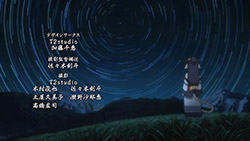 |
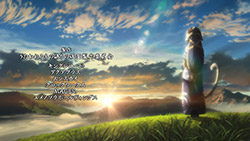 |
ED2: 「星降る空仰ぎ見て」 (Hoshi Kudaru Sora Aogimite) by Suara
Preview
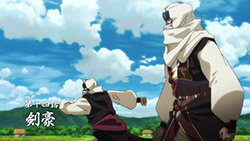 |
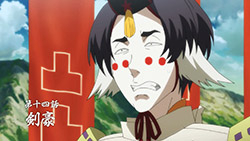 |
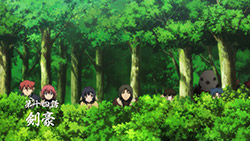 |

Needs more Kuon.
My own observations on the episode:
1) It looked like Uzuurussha united and declared war mainly as a means of survival. That beginning scene with the drought does put them in a sympathetic light.
2) Look at the city that the barbarians invaded – Yamato is freaking rich if all of its cities can look like that.
3) Even though Yamato is feeling cocky toward the barbarian threat, the citizens have plenty of reason to feel confident that they’ll win. Their Emperor has been with them for centuries, seeing them through countless wars. From the looks of it, it doesn’t look like Yamato has lost any of them. Hell, look at Kuon reaction to the situation – where people normally should be stocking up on provisions, instead she sees that people are going on normally with their lives.
4) That overhead shot of the Emperor talking with Haku – the former is sitting at the “center”, with the rings all emanating from him. It’s a small visual trick that I really like.
5) Did you see that the Yamato soldiers are under different banners? It really reinforces the feeling that Yamato is unified only because the Emperor is there overseeing everything.
6) That rift between Oshutoru and Vurai, spawned from the fact that the former defeated the latter right in front of the Emperor. Add in the fact that Vurai is so fanatically loyal, and you can be sure that the situation won’t end well.
7) If I know my anime, then the ending quote “Thou must not awaken a sleeping Akuruturuka” pretty much spells out Uzuurussha’s defeat already.
Different banners is not too odd. One can differentiate between the different divisions of the army that way.
https://randomc.net/image/Utawarerumono/Utawarerumono%20Itsuwari%20no%20Kamen%20-%20OP2%20-%20Large%2005.jpg
More old faces popped up in the new OP, so some possible reinforcements in the future?
https://randomc.net/image/Utawarerumono/Utawarerumono%20Itsuwari%20no%20Kamen%20-%2013%20-%20Large%2012.jpg
Must be a badass with those ears, assuming his race is what I think it is.
The explanation of Yamato politics does indicate the grander scale of the conflict relative to the ones from the original Utawarerumono, since much of the conflict Hakuoro faces is on the scale of an Ouro.
As far as our world history goes, Japan as an island country has had much more defensible borders than China, and some luck (divine intervention?) in the form of typhoons devastating the Mongol fleets. Most of the conflict in Japan was internal, as depicted in the numerous anime revolving around Nobunaga.
Also, without getting too into politics, I think the (non-)reaction of Yamato’s populace is similar to that of the US in recent times. The Wars in Iraq and Afghanistan didn’t affect the way most people went about their daily lives (beyond buying bumper stickers and the explosion of patriotism at sporting events); I think the initial assumption was we’d go in, kill the “bad guys”, then go home after a quick and painless battle. As I’m sure Dekoponpo will find out soon enough, wars generally aren’t quick and easy things to deal with no matter how prosperous a country is.
Although I wonder about Benawi and Kuroro(?) roles. If you’ve seen the game opening for Itsuwari no Kamen, they are shown fighting what appears to be warriors of Yamato.
Not to nitpick, but it was Kublai Khan’s Yuan dynasty that tried to invade Japan. Sure, the Yuan dynasty was made up of Mongol royalty, as I mentioned in my post, but by that point they were practically Chinese. As evidence, I can’t imagine a confederation of horse archer tribes emerging from the steppes … and deciding to jump on a bunch of ships. Doing so would have neutralized all their natural advantages. It’s only when Kublai Khan had become thoroughly Chinese, and had a damn lot of Chinese people at his disposal, that ideas like invading Japan started to seem good.
The reaction of the people of Yamato is certainly like that of the US in recent wars. And their reactions point to the same thing: The incredible wealth of the societies in question. But I don’t know that the Uzuurussha will give Yamato fits. Yamato is more legitimately used to situations like this than the US is/was with Afghanistan and Iraq. If they’re wrong, it’ll be because the Uzuurussha really are taking a page from Ghengis Khan, and are a threat in the same type that Yamato has faced many times before—just of an order of a magnitude more powerful.
Well, you did put up a warning :p
I feel like I’ve always heard them referenced as Mongol invasions, though that might be me just throwing anything related to Genghis or Kublai Khan into the same Mongol folder in my head.
You’re correct, they are generally referred to as Mongol invasions. I’m just not sure that gives the right picture. Mongol-Chinese invasions, perhaps. Though then again, I’m not a historian, so whatryougonnado.
With the look on Oboro’s face and Oshutoro’s question to Haku a while back, I’m guessing Yamato and Tuskuru won’t be staying allies, if they even ally in the first place.
I was actually considering them as allies for Haku & co., whom I consider a separate faction from Yamato despite the connections most of his group has. As long as he’s with Kuon, I doubt Tuskuru will be his enemy. Based on the plot of the original, I feel like a war between the invaders and Yamato is too simplistic to be the real conflict; I wouldn’t be surprised if Haku has to fight against some or all of the Eight Pillar Generals at some point. I thought Vurai in the first OP was an antagonist, and there was also that moment when the Eight Generals all appeared.
Oboro certainly does look less comical than he used to, though.
There’s a rather significant difference between the US war in the Middle East and the war n Itsuwari no Kamen:
The US was going across an ocean to invade large foreign territories. The population of those territories are unsettled because of the war that the US started. The disruption of their lives can be easily blamed on the US.
Yamato is fighting a defensive war in its own territory. Their enemies are marauding invaders who indiscriminately kills citizens of Yamato. The general population of the territories on which the war is waged are citizens of Yamato who rely on the empire for protection. The Yamato military is going to restore the order that the citizens originally enjoyed under imperial protection–and very much preferred over being killed by the invaders.
The idea that Yamato cannot enjoy a quick and painless war merely because it’s war is silly. If the war ends up being costly, it’s because of how formidable the opposing military is, not because there’s some illusive nature of wars that makes it impossible to end them cleanly.
Of course. I wouldn’t take the comparison too literally. It was only meant (from what I understood, and from my point of view) to speak to one thing—of societies going to war whose populations can largely ignore the fact that they’re going to war. Societies who can wage war with little to no sacrifice on their part.
Judging by the final scene (and final lines) of this episode, I would be surprised if the Uzuurussha are the series’ major antagonists (not the least because their leader is so far uncharacterized). More likely they’re meant to show off the power of Yamato and the Akuruturuka.
I could argue that the first salvo of those wars was 9/11, an attack on American soil, which triggered a defensive response exacerbated by the threat of supposed WMDs. Regardless, you kinda missed my point. I wasn’t talking about people located in the conflict zones; rather, on the home front, there isn’t the reaction that generally occurs when armies mobilize. The civilians in Yamato’s capital aren’t changing their way of life in response to the outbreak of war, just as most Americans haven’t in recent conflicts. WWII was also fought overseas, but the civilian population still changed the way they lived to support the war effort. This non-reaction is certainly unusual, particularly in an apparently feudal age.
As far as my “quick and painless” bit, that was the assumption of Dekoponpo and Yamato’s populace. Perhaps I should have been more clear in saying that no matter how rich and powerful your country may be, underestimating the enemy is generally a terrible idea. When a warlord unites a bunch of smaller tribes who had been raiding you and decides to initiate a full-on invasion, the mindset that Dekoponpo shows is probably not the brightest idea. This is clearly on a different scale, so treating it the same as chasing down some raiders isn’t going to end well.
A war fought on foreign soil, for the specific purpose of overthrowing the foreign country’s government, and including the specific step of military occupation until a government of the home country’s liking is established is a war of invasion, regardless of who struck the first blow, whether the war was justified, etc.
Dwelling on the justification, or lack thereof, of protecting a country’s interests by attacking another country home soil misses the distinction between invasions and defensive wars: An invasion requires a way of pacifying the native population to prevent an uprising, whether that is because the invaders are welcomed as liberators, through genocide, or something else. A defensive war on one’s home soil generally does not have this issue: That country’s own people live on the land and presumably would welcome the army–at least when they are repelling the invaders.
As for the attitude: So far Dekoponpo and the emperor are the only person who is specifically shown to treating the invaders as the same band of nomadic raiders (and perhaps the fallout from the emperor’s attitude serves as a basis for the generals to rebel against the emperor). The other generals specifically noted the unusually large scale and unity of the tribes in this invasion.
The lack of militarization in the civilian population of the capital can be attributed to a few key differences between feudal China (upon which Yamato was based) and feudal Europe:
1. Feudal China maintained a standing army for defense, particularly defense against barbarian invasions. Feudal Europe used peasant militias and a small core of knights.
2. Feudal China was a highly centralized empire where the army can requisition supplies locally. Feudal Europe was more of an every lord for himself organization.
Assuming Yamato is organized like ancient China, it would take more than just a war to significantly affect the capital: It would take a war that was well in excess of the standing army’s ability to fight.
So far, this series has been as laid-back as its amnesiac main character.
I hope this war arc changes that.
This episode did good job at showing why the Uzuurussha do what they do. And that large part of Yamato’s people are pretty out-of-touch with realities of war (not a bad thing actually). A really nice set-up episode.
The emperor seems a pretty fun guy now that we actually got to see him talking with Haku.
Something I feel the anime could have said earlier was Atui and Rurutie’s position in Yamato; we knew they were princesses, but their introductions gave the feel they were foreign ones (which is kind of half-correct anyways I suppose).
I didn’t start to figure their connections out until I saw Atui’s dad’s hairdo in one of the previous episodes featuring the Eight Pillar Generals, which shouldn’t really be the way to figure out who’s an important person. That kind of led to making a connection between Rurutie and her dad too.
Incidentally I’m somewhat surprised I like Atui and Rurutie enough to care about them going to war in place of their fathers. They didn’t exactly do much after their introductions during the slice-of-episode half of the show.
On Munechika and the Generals of Left and Right – I got the idea that Munechika defends the city while the generals defend the palace. Or the other way around. And then Munechika was sent to war.
But it’s actually make sense. if munechika is the best shield, then her role is rear vanguard, so that they don’t fall to double envelopment.
I agree it does make sense that way. All I’m saying is that the emperor’s explanation of those three’s role wasn’t exactly clear-cut. Or the translator’s in case it was something lost in translation.
The ending scene with Rurutie and Atui was odd for me. It didn’t seem needed if those letters were just telling them to go to war, since their reactions were kinda obvious given their personalities(aka Rurutie doesn’t want to go, Atui just kinda shrugs).
I feel like that might’ve been more of a hint that they’ll be up to something that’ll be putting their own territory’s interests ahead of Yamato’s. Probably not something as drastic as paving the way for seceding, but something shady.
@Erimaki
Yeah, they dropped the ball on properly explaining who Rurutie and Atui are until now. I knew because of commenters, but it wasn’t done very well in the text. Though at first I thought the “princess” moniker was more akin to ojou-sama than a literal princess, since I did realize from early on that they were citizens of Yamato.
@Aex
I personally disagree. I liked the last scene with Rurutie and Atui. I didn’t think they would be gung-ho, but it was nice to see exactly how they felt about it. It also shows that someone, at least, is taking this war seriously.
The true story begins… I think?
robocop theme song anyone?
I wonder if white fox tried to do the same thing they did with steins gate. A cour of slice of life like situations to get to know the characters first. But without the brutal and immediate cerebus.
We know that Atui (whom I keep thinking of as Osaka) is a strong fighter because of how effectively she used her spear to cut down multiple insect monsters in episode 8, despite being grossed out by them.
But, have we ever seen Rurutie fight?
Perhaps Yamato has a structure similar to the Holy Roman Empire, where the rulers of some of the constituent states were princes in their own right.
I believe it is like the Romans, or the ancient Chinese or Japanese or … a lot of ancient societies, to be honest. This is bolstered by their combined army marching under different banners, and each section being explicitly noted as belonging to each of the generals.
People like Vurai are only a problem when a country needs reforms, or when an emperor dies. The first because they’ll just kill reformists for question the emperor, and the second because their blind loyalty will then turn into blind loyalty in themselves, convincing them that only they can continue what the emperor started. With how old the emperor is I wouldn’t be surprised if his health became an issue later, in which case Vurai will either put Anju on the chopping block because he doesn’t think she has what it takes, or he’ll force her to marry him so she can be a puppet while he rules “properly”, “in her name”. Either way, it’d probably be a civil war.
For a war against another country, though, sometimes you need an extremist that isn’t afraid to rule a couple hundred people through. Especially if he’s good at it. With how desperate this other army is, I don’t see them being willing to negotiate.
*run* a couple hundred people through. Like with a spear. Curse you, lack of edit button.
The whole “The warriors of Yamato are never defeated. Thus, any who are defeated are not warriors of Yamato” line is sound strategy ultimately designed to save lives (oddly enough the Russians get it right historically).
By sacrificing soldiers, who are expected to make the ultimate sacrifice for their nation when called upon to do so, Yamato demonstrates that the human shield tactic is worthless against them. Why would an enemy waste time and resources (presumably they’d need a significant guard presence to keep prisoners in line when faced with friendly forces) keeping it up?
Not to say they won’t just execute prisoners from now on (I’ve no doubt things aren’t going to go well) but that is hardly a sensible tactic either, it guarantees the enemy will fight to the death. More likely, prisoners will just be left behind.
It’s posturing sure, but Yamato is better off for it in the long run.
You’re not wrong, partially. It’s, unfortunately, probably the right tactic—negotiation isn’t a sign of weakness, but hostage taking on that level isn’t something that can be negotiated around. You just have to show the enemy that their petty tactics won’t effect you, and put them down as quickly as possible.
That said, most of the people being taken hostage and shoved to the front of the lines are almost certainly civilians, and espousing a philosophy like that reveals a fanatical mind. The same strategy can be arrived at through kindness and strength rather than barbarous tunnel-vision.
Shit’s about to go down Utawarerumuno style.
I wonder who owns the Green land in the map if we assume that Yamato is brown and Uzurusafuwead is grey.
Is it just me, or does Benawi look exactly the same from the original series? I mean he looks like he hasn’t aged at all!
Warriors as great as Benawi do not age. They slay even death.
Well when I found out how young Karura looks in this series I realized they don’t age. Or they age very, very slowly.
The animal hybrid’s life span is almost double regular humans, their time to puberty is the same as us but once they mature there aging slows down.
As if having kawaii and/or cool nekomimi wasn’t enough. Gah! (╯°□°)╯︵ ┻━┻
I feel like the war was introduced too quickly. While the (re)introduction of Kuon’s moms and a few brief scenes hinted that Yamato would go to war at some point we never really saw it and then all of a sudden this episode drops a war plot on us. I feel like they could have used another episode or two to introduce the war plot so that this episode would make more sense.
That aside, once this episode established that war was happening it did a good job at showing the cast and their reactions to the war as well as explaining who the primary fighters in the war are.
I’m going to miss the old OP and ED. While the visuals of the new ones are nice I liked the actual songs more.
*the actual songs of the original OP and ED more.
To be fair, a war suddenly popping up isn’t surprising in this kind of society. We forget about it now because we’re so inundated with information, even us civilians, but the “fog of war” used to be a serious problem. You could lose track of entire armies for long periods of time. If they weren’t in sight of you right now, you probably didn’t know where they were, or at best you had some scouts giving you information you could maybe trust.
Granted, we’ve been following some high level characters in this society, so a mention or two of dealing with barbarians wouldn’t have one amiss. But the Uzuurussha were quite probably quiet for a while before this, since they would have been fighting among one another while their new leader consolidated control under him.
Personally with everything else happening so slow up till this point I am glad the showed signs of picking up the pace a little bit.
It’s explained in the game that Munechika guards the border to Uzuurussha and the Left and Right guards the capital.
On some other note, I’d always thought Oasis would be a better translation for Woshisu’s name.
Thanks. I’ll add a note to my post.
totally shipping archer twins with priestess twins if they ever run into each other
Pretty sure they only have eyes for waka-sama 😉
Kinda worried about Rurutie. She’s shown no combat capability and seems really worried getting that letter. Atui and Kiuru seem like they could handle them selves just fine. But from what we’ve seem, I think Kuon and Mororo are more survivable in a battlefield compared to Rurutie.
She got the demon chicken. She will be alright.
Is it me or with internal security Generals sent out in the field one more ambitious from the 8 pillars might try to stage a coup?
With Munechika probably marching out immediately after them to try and keep up with ehr infantry that would leave only 3 generals in the capital (3 are in the provinces, right/left and Munechika are chasing Dekoponpo) which means 2 of the 3 if conspiring could have seized the capital quite easily…
What a difference from the first cour. In a way, almost like a different show with substantial happenings. Played out exactly as I expected with the new cour, but appreciated nonetheless. So while I’m sure if this was the best episode of the series thus far, IMO it was substantially better than the past few.
Still with Atui and Rurutie conveniently going off to war, I wish the first cour wouldn’t have been so lackadaisical. No doubt they will be suddenly highly combat proficient like Haku. To be fair, we did see some of that with Atui, but not with Rurutie. All I got on her is BL/yaoi fanatic. I saw a youtube video of the game, where a player was showing off the various characters skills/special combat moves while leveling up. Now level grinding doesn’t usually make for the best anime, but the show could have done a better job setting things up IMO. I think Kiuru had a few moments of showing off his bow skills before. Not asking for much on this.
Not a huge deal – moving on. While I enjoyed the episode in general, one thing that still doesn’t sit entirely well with me is the comedy/serious integration. Dekoponpo’s comedy antics, including the “so mad I have steam coming out my ears” (Stilts you failed me on the screen cap) didn’t fit very well for the moment IMO. I do agree with Stilts that while “I owe his dad” is at least something as a reason for Dekoponpo to have his position, it’s not a substantial one. Dude has idiot train-wreck written all over him – as we saw with him rushing off to battle where he no doubt will fail. He definitely reminds me of some characters in the first series, but those just seem to be better integrated.
An intriguing point was the apparent rivalry between Vurai and Oshutoru. Vurai may be the most loyal to the emperor, but that guy is pretty intense, and not necessarily in a good way. Prisoners? What prisoners. >_> I wonder with Oshutoru (and Mikazuchi) now rushing off to save dumbass, if Vurai might be up to no good while hanging around in the capital.